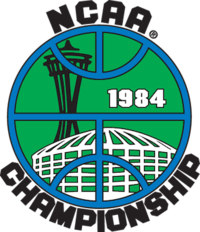 | |||||
| Season | 1983–84 | ||||
|---|---|---|---|---|---|
| Teams | 53 | ||||
| Finals site | Kingdome Seattle | ||||
| Champions | Georgetown Hoyas (1st title, 3rd title game, 4th Final Four) | ||||
| Runner-up | Houston Cougars (2nd title game, 5th Final Four) | ||||
| Semifinalists |
| ||||
| Winning coach | John Thompson (1st title) | ||||
| MOP | Patrick Ewing (Georgetown) | ||||
| Attendance | 397,481 | ||||
| Top scorer | Roosevelt Chapman (Dayton) (105 points) | ||||
| |||||
The 1984 NCAA Division I men's basketball tournament involved 53 schools playing in single-elimination play to determine the national champion of men's NCAA Division I college basketball. It began on March 13, 1984, and ended with the championship game on April 2 in Seattle. A total of 52 games were played. This was the last tournament in which some teams earned first-round byes as the field expanded to 64 teams beginning in the 1985 tournament when each team played in the first round. It was also the second year with a preliminary round; preliminary games would not be played again until 2001.
Georgetown, coached by John Thompson, won the national title with an 84–75 victory in the final game over Houston, coached by Guy Lewis. Patrick Ewing of Georgetown was named the tournament's Most Outstanding Player. Thompson became the first African-American head coach to lead his team to any NCAA Division I title.
Georgetown reached the Final Four for the third time in school history and second time in three years to face Kentucky, a team that had never lost a national semifinal game and was led by the "Twin Towers", Sam Bowie and Melvin Turpin. Bowie and Turpin managed to get Ewing into foul trouble early, and with him on the bench and Reggie Williams shooting only 1-for-7 (14.3%) from the field during the game, the Wildcats raced out to a 27–15 lead with 3:06 left in the first half. After that, however, the Hoyas made a defensive stand still unequalled in college basketball: Kentucky scored only two more points in the first half; the Wildcats also did not score in the first 9 minutes 55 seconds of the second half, missing their first 12 shots and after that shooting 3-for-21 (14.3%) during the remainder of the game. Overall, Kentucky shot 3-for-33 (9.1 percent) from the field during the second half. Although he played for only 17 minutes and suffered a season-ending foot injury in the second half, Gene Smith had one of the best defensive games of his career. Bowie and Turpin finished the game a combined 5-for-21, Wingate scored 12 points and held Kentucky's Jim Master to 2-for-7 (28.6%) shooting from the field, Michael Jackson scored 12 points and pulled down a career-high 10 rebounds, and Georgetown won 53–40 to advance to the national final for the third time in school history and second time in three years.[1][2][3][4][5][6]
In the first national semifinal, Houston, playing in its third consecutive Final Four, edged Virginia, which reached the Final Four as a No. 7 seed in the East region, 49–47. The Cavaliers reached the national semifinals despite the graduation of four-time All-American Ralph Sampson the previous season. Coincidentally, Houston's All-America center, Akeem Olajuwon, would soon become Sampson's teammate with the Houston Rockets.
In the NCAA final, Georgetown faced Houston on April 2. Reggie Williams demonstrated his true potential for the first time, putting in a strong defensive performance and shooting 9-for-18 (50.0%) from the field with 19 points and seven rebounds in the game, while David Wingate scored 16 points and Ewing managed 10 points and nine rebounds. Jackson scored 11 points and had six assists, two of which set up Ewing and Michael Graham for decisive baskets late in the game. The game was decided well before the final whistle, and the Hoyas won the school's first national championship 84–75. Late in the game, with Georgetown enjoying a comfortable lead, Thompson began to pull starters out and give bench players some time on the court; the game's enduring image came when senior guard Fred Brown came out of the game. Two years earlier, Brown had mistakenly passed the ball to North Carolina's James Worthy in the last seconds of the 1982 championship game, ruining Georgetown's chances for a final game-winning shot and allowing North Carolina to take the national championship, and cameras had captured Thompson consoling a devastated Brown with a hug as the Tar Heels celebrated. As Brown left the 1984 championship game, cameras caught Brown and Thompson again embracing on the sideline, this time to celebrate a victory.[1][2][3][4][6][7]
- ^ a b "The Georgetown Basketball History Project: The Top 100: 1. Patrick Ewing". Archived from the original on October 6, 2016. Retrieved March 31, 2017.
- ^ a b "The Georgetown Basketball History Project: The Top 100: 3. Reggie Williams". Archived from the original on March 4, 2016. Retrieved March 31, 2017.
- ^ a b "The Georgetown Basketball History Project: The Top 100: 11. David Wingate". Archived from the original on March 29, 2015. Retrieved March 31, 2017.
- ^ a b "The Georgetown Basketball History Project: The Top 100: 14. Michael Jackson". Archived from the original on February 13, 2012. Retrieved March 31, 2017.
- ^ "The Georgetown Basketball History Project: The Top 100: 68. Gene Smith". Archived from the original on March 29, 2015. Retrieved March 31, 2017.
- ^ a b "The Georgetown Basketball History Project: Classic Games". Archived from the original on September 24, 2015. Retrieved March 31, 2017.
- ^ "The Georgetown Basketball History Project: the Top 100: 48. Fred Brown". Archived from the original on September 24, 2015. Retrieved March 31, 2017.